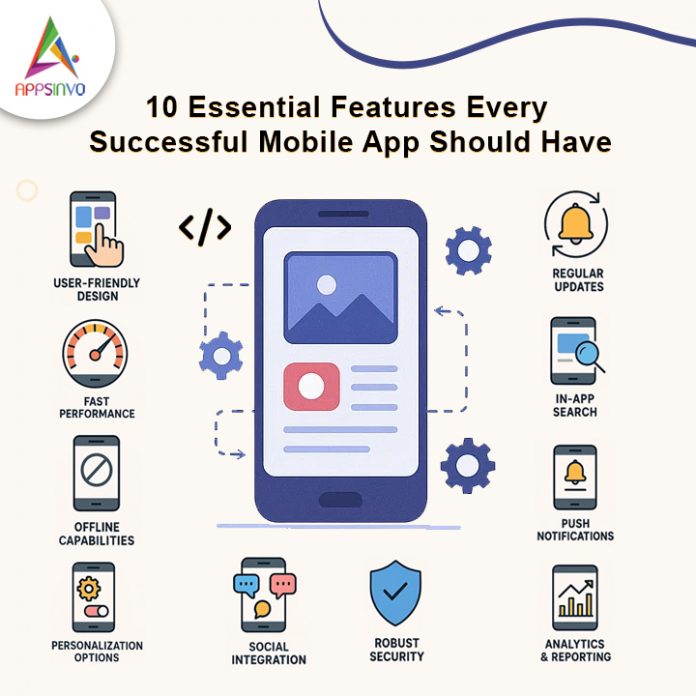In today’s digital world, mobile apps are critical for businesses trying to engage customers and improve their services. However, not all apps attain the expected level of success. To stand out in a crowded market, your mobile app must include several crucial characteristics. Here are eleven fundamental elements that any successful mobile app should have.
1. User-Friendly Interface
The interface is very important in ensuring a positive user experience and a clean interface. The user should navigate the app easily, comprehend its functions, and search for what they want without frustration. A good design will use easily understandable buttons, fonts, and logical designs that will take the user through the app in a smooth manner.
2. Registration and Login Options.
It is more accessible by having several options for registration and logins. The user option should also allow one to register using an email, phone number, or even a social network like Facebook and Google. Offering a fast and easy onboarding experience will help those rates increase high user retention rates since it will diminish entry barriers.
3. Push Notifications
Push notifications are important in keeping users interested in your app. They are applicable in sharing updates, promotions, or customized content according to the user behavior. Nevertheless, it is necessary to find a balance, and excessive notifications can irritate users and make them uninstall the app. One can improve user experience and retention by customizing notifications to their personal preferences.
4. Offline Functionality
In most situations, the internet would not be available to the users. Offline functionality is a feature that will enable the user to use some features of the app even when they are not connected to the internet. This may involve accessing already loaded content or enabling the users to accomplish tasks to be synchronized when they go back online.
5. Search Functionality
An effective search option will be required, particularly in apps that are content-intensive. Users are expected to find what they are seeking within the shortest time possible with the help of a keyword or filter. Introducing the use of state-of-the-art search features, like voice search or predictive text, can help to increase usability and user satisfaction.
6. Social Sharing Options
By adding the social media sharing features, you will allow your users to share their experiences, achievements, or content on your app with their network. Not only does this make users more engaged, but also a good marketing tool, making your app more visible and getting new users.
7. User Feedback and Reviews
The feedback mechanism will enable users to give their experiences and suggestions to enable you to improve the app as time goes by. Favorable feedback can also be used to attract new users to download your app. You should also consider the user-friendly features of making a comment and rating the experience.
8. Security Features
With increased worries about data privacy, implementing strong security measures is critical. Protect user information by implementing secure login mechanisms, data encryption, and compliance with requirements such as GDPR. Transparency regarding how user data is acquired and handled can help foster trust and increase downloads.
9. Analysis and Reporting
Integrating analytics tools allows you to monitor user behaviour, engagement, and retention measures. Understanding how people engage with your app enables you to make more informed decisions about updates and upgrades. This data-driven strategy has the potential to dramatically improve the long-term success of your app.
FAQs
1. Why is a user-friendly interface so important?
The interface should also be user-friendly because it is the interface that directly affects user experience. In case users find the app difficult to use, they will drop it and switch to others. There is an intuitive design that creates user involvement and satisfaction.
2. What is the reason why I should use more than one way to log in?
The use of several entrance options makes the process of onboarding easier since the users can easily gain access to your app. This may go a long way in enhancing user retention because reduced barriers to entry will translate to an increase in the number of users registering.
3. What are the benefits of push notifications?
The use of push notifications keeps the user updated on the changes, promotions, or personalized information, thereby motivating them to revisit the app. Nonetheless, one should make a personalization of the notifications to reduce instances of over-saturating users, hence making them disengaged.
4. What is the role of security in the success of apps?
Security is essential in the development of user trust. As data breaches remain an issue, it is advisable to add powerful security services that will keep the user data intact and ensure the reputation of your app. There are better chances of users downloading and using apps they consider as being safe.
5. Why is it important to maintain a mobile app on a regular basis?
Maintenance also makes the app functional, secure, and relevant. It enables developers to correct bugs, improve features, and address the feedback provided by users. Maintaining the freshness and functionality of the app is part of the retention and satisfaction of users in the long term.
Including these crucial aspects in your mobile app can significantly increase its chances of success. By focusing on user experience, security, and engagement, you can produce a compelling product that satisfies the demands of your target audience while standing out in a competitive marketplace.













http://www.arttree.com.au is Australia Popular Online Art Store. We sell Canvas Prints, Handmade Canvas Oil Paintings, Customer Artwork, Handmade Canvas Portraits. We Offer Year Round Sale and Get Up-to 70 Percent OFF Discount. We give FREE Delivery Australia, Sydney, Melbourne, Brisbane, Adelaide, Hobart and all regional areas. We ship Worldwide at many international locations.
Thanks for your publication. I would also love to say that the very first thing you will need to accomplish is determine if you really need credit improvement. To do that you will need to get your hands on a copy of your credit history. That should really not be difficult, since the government mandates that you are allowed to get one cost-free copy of your own credit report yearly. You just have to ask the right individuals. You can either find out from the website for the Federal Trade Commission and also contact one of the major credit agencies right away.
Hey There. I found your blog the use of msn. That is an extremely well written article. I will be sure to bookmark it and return to read extra of your useful info. Thanks for the post. I?ll certainly comeback.
Excellent blog! Do you have any suggestions for aspiring writers? I’m hoping to start my own blog soon but I’m a little lost on everything. Would you suggest starting with a free platform like WordPress or go for a paid option? There are so many options out there that I’m totally overwhelmed .. Any tips? Thanks!
magnificent post, very informative. I wonder why the other specialists of this sector do not notice this. You should continue your writing. I am confident, you’ve a great readers’ base already!
I just could not depart your site prior to suggesting that I really enjoyed the standard information a person provide for your visitors? Is gonna be back often in order to check up on new posts
Thanks for your write-up on the travel industry. I’d personally also like to add that if you are a senior considering traveling, it really is absolutely crucial that you buy travel insurance for older persons. When traveling, senior citizens are at greatest risk of having a health-related emergency. Getting the right insurance policy package in your age group can protect your health and provide peace of mind.
Awesome site you have here but I was wondering if you knew of any user discussion forums that cover the same topics talked about here? I’d really love to be a part of community where I can get feed-back from other knowledgeable people that share the same interest. If you have any suggestions, please let me know. Bless you!
Hey, you used to write magnificent, but the last few posts have been kinda boring? I miss your super writings. Past few posts are just a little bit out of track! come on!
Wow, wonderful weblog format! How long have you ever been running a blog for? you made running a blog look easy. The full look of your web site is wonderful, as well as the content!
magnificent post, very informative. I wonder why the other specialists of this sector don’t notice this. You must continue your writing. I am confident, you’ve a huge readers’ base already!
This design is steller! You certainly know how to keep a reader amused. Between your wit and your videos, I was almost moved to start my own blog (well, almost…HaHa!) Fantastic job. I really loved what you had to say, and more than that, how you presented it. Too cool!
I?m now not positive where you’re getting your information, however great topic. I needs to spend a while studying more or working out more. Thank you for excellent information I used to be searching for this information for my mission.
I can’t express how much I appreciate the effort the author has put into creating this remarkable piece of content. The clarity of the writing, the depth of analysis, and the abundance of information offered are simply remarkable. His zeal for the subject is evident, and it has definitely struck a chord with me. Thank you, author, for sharing your knowledge and enlightening our lives with this extraordinary article!
Great post. It’s very well organized and quite informative. Stick with it.
Thank you for sharing excellent informations. Your web-site is very cool. I am impressed by the details that you have on this web site. It reveals how nicely you perceive this subject. Bookmarked this website page, will come back for more articles. You, my friend, ROCK! I found simply the information I already searched all over the place and simply could not come across. What an ideal site.
Hi my friend! I wish to say that this post is amazing, nice written and include approximately all important infos. I would like to see more posts like this.
Magnificent goods from you, man. I’ve be mindful your stuff prior to and you’re just extremely excellent. I really like what you’ve received right here, really like what you are stating and the best way through which you are saying it. You’re making it entertaining and you continue to take care of to keep it smart. I can’t wait to learn much more from you. That is really a great website.
I’ve been surfing online greater than 3 hours nowadays, yet I never discovered any attention-grabbing article like yours. It is lovely price enough for me. In my view, if all web owners and bloggers made just right content material as you did, the net can be a lot more useful than ever before.
Hi just wanted to give you a quick heads up and let you know a few of the images aren’t loading properly. I’m not sure why but I think its a linking issue. I’ve tried it in two different internet browsers and both show the same outcome.
Thanks for your short article. I would love to say that the health insurance agent also works well with the benefit of the coordinators of the group insurance coverage. The health insurance agent is given an index of benefits looked for by a person or a group coordinator. Such a broker will is search for individuals or perhaps coordinators which will best complement those needs. Then he gifts his recommendations and if each party agree, the broker formulates legal contract between the two parties.
Hello, i read your blog occasionally and i own a similar one and i was just curious if you get a lot of spam responses? If so how do you prevent it, any plugin or anything you can suggest? I get so much lately it’s driving me mad so any assistance is very much appreciated.
I have noticed that over the course of constructing a relationship with real estate managers, you’ll be able to get them to understand that, in every real estate financial transaction, a commission is paid. Ultimately, FSBO sellers will not “save” the commission. Rather, they fight to win the commission by way of doing a good agent’s task. In this, they invest their money along with time to complete, as best they will, the assignments of an realtor. Those duties include getting known the home through marketing, offering the home to prospective buyers, building a sense of buyer emergency in order to prompt an offer, arranging home inspections, controlling qualification checks with the mortgage lender, supervising maintenance, and facilitating the closing of the deal.
Hello comrades
Good evening. A 31 cool site 1 that I found on the Internet.
Check out this site. There’s a great article there. https://bizminton.com/whats-the-right-way-to-idle-away-your-time-to-rest/|
There is sure to be a lot of useful and interesting information for you here.
You’ll find everything you need and more. Feel free to follow the link below.
Attractive component to content. I just stumbled upon your web site and in accession capital to say that I get in fact loved account your weblog posts. Anyway I will be subscribing in your feeds and even I success you access persistently rapidly.
Hello !
Hi. A 31 nice website 1 that I found on the Internet.
Check out this website. There’s a great article there. https://www.hermitgamer.com/how-video-games-can-help-manage-stress-and-anxiety/|
There is sure to be a lot of useful and interesting information for you here.
You’ll find everything you need and more. Feel free to follow the link below.
Hey! Do you use Twitter? I’d like to follow you if that would be ok. I’m absolutely enjoying your blog and look forward to new posts.
Hello and welcome!
Need to recover lost access to critical data or accounts? Our professional hacking services provide tailored support to handle such tasks securely and anonymously. Our platform emphasizes encrypted communication and confidentiality. From database access to social media recovery, our experts deliver fast results. We ensure that each project is completed with discretion and guaranteed satisfaction.
https://hackerslist.com/
Thank you for choosing HackersList!